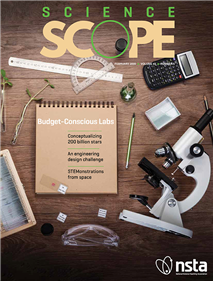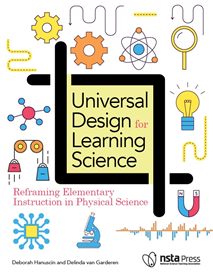All Resources
Journal Article
Tell the story of an important event that happened in your family. Tell the story of a place that is important to your family. Tell the story of how your family or the world will change in 10 years....
By Carrie Tzou, Daniel Rother, Ashley Braun, Elizabeth Starks, Meixi Ng, Enrique Suárez, Amanda Rambayon, Philip Bell, Don LaBonte, Amy Twito, Shawn Peterson, Sara Marie Ortiz, and Megan Bang
Journal Article
The Wings Over Water (WOW) collaboration began with ospreys....
By Allison De Jong, Jenélle Dowling, Erick Greene, and Sharon Leigh Miles
Journal Article
Building Community With Educators
After a string of successes in our teacher professional development programs at the Denver Museum of Nature & Science (DMNS), I recently began to notice a disconcerting trend: Teachers stopped coming. Despite efforts to draw program participant...
By Robert Payo
Journal Article
By Byung-Yeol Park, Laura Rodriguez, and Todd Campbell
Journal Article
Arguing About a Chemical Change
Use a sample ACT writing prompt in an explore-before-explain instructional sequence to a 9th-grade physical science class to promote student learning and demonstrate that mass is conserved in a chemical reaction ...
By Patrick Brown
Journal Article
By MICHAEL GIAMELLARO, JACKSON BLACKBURN, MOLLY HONEA, AND JACOB LAPLANTE
Journal Article
High school students grew up online and in video games. FLEET is a free ship-design simulator that reaches students in their native environment—video games. It is also a physics simulator that applies content first learned through hands-on sci...
By MICHAEL BRISCOE
Journal Article
Spicing Up Your Classroom With Games
When was the last time you sat in a classroom as a student instead of as the teacher? Did you notice what types of activities you enjoyed and which frustrated or bored you? I have found profound professional development as a student—and the subject...
By Melanie Pearlman
Journal Article
By JAMES CARRIGAN, ALEC BODZIN, THOMAS HAMMOND, SCOTT RUTZMOSER, KATE POPEJOY, AND WILLIAM FARINA
Journal Article
For most people, coffee roasting is a mysterious process. Chemically, it’s equally mysterious; the roasting process gives rise to over 800 compounds. The science of coffee, from seed to bean to cup of aromatic brew, includes multiple areas of ...
By Tom Cubbage
Journal Article
Envisioning the Possibilities of Educational Gaming with Carl Sagan
Science games and simulations—whether in the form of a board game or a system incorporating augmented or virtual reality—can provide students with opportunities to visualize abstract concepts, engage in active learning and knowledge construc...
By KELLIE TAYLOR
Journal Article
Ecologists are biologists who study entire ecosystems and the interactions among their living and non-living components. Ecology can be applied in areas such as conservation biology, natural resource management, and even economics. Todd Elliott, who ...
By Luba Vangelova
Journal Article
“Plants do photosynthesis and animals do cellular respiration.” At some point in our science classes many of us have had this statement uttered to us by a teacher or said it to help students remember one of the key distinctions between plants and...
By Jennifer l. Maeng and Amanda Gonczi
Journal Article
Interactive science simulations (sims) have become popular tools for science educators, and research confirms that sims can improve student learning (Rutten, van Joolingen, and van der Veen 2012). Over the past 15 years, the PhET Interac- tive S...
By ARGENTA PRICE, CARL WIEMAN, AND KATHERINE PERKINS
Journal Article
Atmospheric Scientist Shawn Urbanski
Atmospheric scientists study the chemical composition of the atmosphere. More specifically, they look at how atmospheric gases, liquids, and solids interact both with each other and with the earth’s surface. This helps people understand such phenom...
By Luba Vangelova
Journal
The Science Teacher—February 2020
Volume 87, Number 6 The word assessment conjures up many questions for science teachers. Is it a necessary evil? When is it helpful and beneficial? What is lost during the mandatory weeks of proctoring standardized exams to our overtested, str...
Web Seminar
Web Seminar: Teaching Science Through Trade Books, March 3, 2020
Join us on Tuesday, March 3, 2020, starting at 8:30 pm ET to learn how you can use trade books to teach science....
Journal
Connected Science Learning January–March 2020
Volume 2, Issue 1 Why Collaborate? This issue of Connected Science Learning focuses on Effective Collaboration. ...
Journal Article
As a Connected Science Learning reader, you already know that collaboration is what this journal is all about. We strive to publish articles that highlight ways different organizations come together to connect in-school STEM (science, technology, e...
By Beth Murphy
Journal Article
A Tale of Two Partnership Models
Engaging in science at an early age cultivates foundational mindsets and practices for future learning, such as critical thinking, problem-solving, and curiosity (Hadani and Rood 2018; McClure et al. 2017). Science learning can be robust for young ...
By Jenny Ingber, Jacqueline Horgan, and Veena Vasudevan
Journal Article
Dealing With Disasters Through Emergency Response Teen Science Cafés
According to a 2012 United Nations report, many countries prioritize children’s learning about the genesis, prevention, and mitigation of natural disasters (Selby and Kagawa 2012); the United States, however, falls behind with respect to disaster...
By Jan Mokros, Michelle Hall, and Michael Mayhew
Journal Article
Engineering Explorations are curriculum modules that engage children across contexts in learning about science and engineering. We used them to leverage multiple education sectors (K–12 schools, museums, higher education, and afterschool programs...
By Danielle B. Harlow, Ron Skinner, Tarah Connolly, and Alexandria Muller
Book Chapter
Here’s good news: With this practical book, you can learn from experienced elementary school educators about how to make physical science both challenging and accessible for a diverse range of students. Written by teachers for teachers, Universal D...






